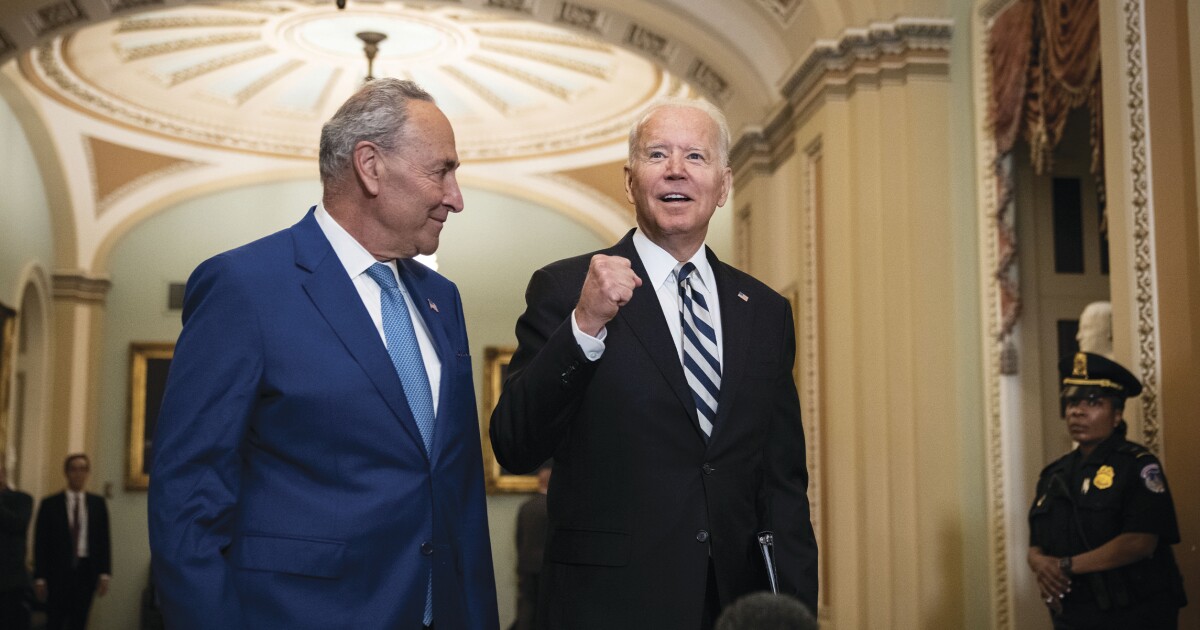

After high-profile failures early in the year, Senate Democrats were able to deliver on major elements of President Joe Biden ‘s agenda, racking up a series of legislative wins in 2022.
Two centrist Democrats — Sens. Joe Manchin (WV) and Kyrsten Sinema (AZ), who went on to become an independent — stood in the way of the party passing Biden’s Build Back Better. They also stymied calls to eliminate the filibuster, which in effect creates a 60-vote threshold for bills to pass in the upper chamber. In a 50-50 Senate, that proved fatal for the party’s more ambitious legislation.
Yet as the year progressed, the logjam broke, and Senate Majority Leader Chuck Schumer (D-NY) was able to pass key bills, some of them bipartisan, that Democrats ran on ahead of the midterm elections. Here are some of the year’s most significant legislation, listed chronologically.
Bipartisan bill overhauling U.S. Postal Service
The Senate passed legislation to overhaul the U.S. Postal Service’s finances and allow the agency to modernize its operations in early March by a vote of 79-19. The Postal Service Reform Act requires postal employees to enroll in Medicare when eligible while getting rid of a mandate that forced the agency to cover healthcare costs years in advance. It also requires the Postal Service to create an online dashboard with delivery time data. Biden signed the bill into law on April 6, 2022.
$1.5 trillion government funding bill
The Senate approved a massive spending package to keep the government open on March 10, 2022, after punting the measure for about five months. It contained $1.5 trillion in funding, including increases for domestic and national security programs. Additionally, it provided $13.6 billion in emergency aid for Ukraine
. In order for the bill to pass, Democrats had to drop some priorities, such as a White House request for more pandemic aid. Biden signed the bill into law on March 15, 2022.
LAWMAKERS REACH DEAL ON $1.5 TRILLION SPENDING BILL TO AVOID SHUTDOWN AND AID TO UKRAINE
First major federal gun safety legislation in decades
The Senate passed the most significant federal legislation to address gun violence in decades, voting 65-33 in late June. The bill included millions of dollars for school safety, mental health and crisis intervention programs, and incentives for states to include juvenile records in the National Instant Criminal Background Check System. The bill also made significant changes to the process by which someone ages 18 to 21 is able to buy a gun. Biden signed the bill into law on June 25, 2022.
Bipartisan bill to subsidize U.S.-made semiconductor chips
The Senate passed a bill in late July that would provide $52 billion in subsidies to domestic semiconductor manufacturers and invest billions in science and technology innovation. The legislation, which was designed to reduce U.S. reliance on Chinese and other foreign-manufactured chips, passed 64-33 after more than a year of negotiations. Biden signed the bill into law on Aug. 9, 2022.
Bill to expand healthcare benefits for veterans exposed to toxic burn pits
The Senate approved a measure to provide healthcare and benefits to veterans who were exposed to toxins, from Agent Orange in Vietnam to burn pits in Iraq and Afghanistan. The bill, known as the PACT Act
, takes away the burden of veterans having to prove their illness was caused by toxic exposure in the military, enabling them to get coverage from the Department of Veterans Affairs
. The legislation, which passed in a bipartisan 86-11 vote, has been hailed as the largest expansion of care in VA history. Biden signed the bill into law on Aug. 11, 2022.
Historic climate, tax, and healthcare bill
The Senate passed a sweeping economic bill that included major provisions on healthcare, taxation, and climate change. It was the most significant federal investment to counter climate change and the cost of prescription drugs in history. The vote was 51-50, strictly along party lines, with all Republicans voting no and all Democrats voting yes. Vice President Kamala Harris was needed to cast the tiebreaking vote. The $750 billion dollar legislation was a significantly scaled-back version of the $3.5 trillion agenda that was first proposed by the Biden administration. Biden signed the bill into law on Aug. 16, 2022.
Marijuana research bill
The Senate passed a bipartisan bill that makes it easier for researchers and manufacturers to study marijuana, the first time lawmakers ever passed legislation increasing access to the drug. The measure, which passed with unanimous consent, eases registration for medical and scientific research on marijuana and its compounds. Biden signed the bill
into law on Dec. 2, 2022.
Bill to protect same-sex and interracial marriage
The Senate passed a bill to codify the right to same-sex and interracial marriage, with 12 Republicans joining all Democrats. The legislation included an amendment providing additional protections for religious liberty and faith-based nonprofit groups.
It gained traction after Supreme Court Justice Clarence Thomas raised the prospect of the court scrapping rights like same-sex marriage and contraception in a concurring opinion to the court’s decision to overturn abortion rights this summer. Biden signed the bill into law on Dec. 13, 2022.
CLICK HERE TO READ MORE FROM THE WASHINGTON EXAMINER
2023 omnibus bill
The Senate passed a
$1.7 trillion omnibus
that encompasses a dozen annual spending bills before Christmas Eve. The legislation includes $45 billion in aid for the war in Ukraine and another $41 billion for natural disaster victims. The Electoral Count Reform Act, a bipartisan bill designed to make it more difficult to overturn a presidential election, made it into the final legislation, as did Sen. Josh Hawley’s (R-MO) measure banning the use of TikTok on government devices.
“The omnibus was an appropriate metaphor for the last two years. A lot of ‘sturm und drang,’ a lot of ups and downs — but, in the end, a great result that really helped the American people, and that’s true of the omnibus,” said Schumer.
Biden signed the bill into law ahead of the Dec. 30 deadline to keep the government open.







